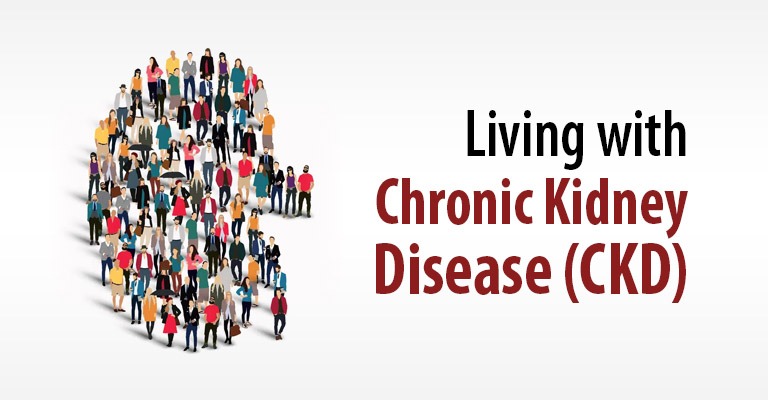A gradual decline of kidney function over a period of time is called chronic kidney disease or CKD. Progressively worsening kidney function diminishes its ability to filter wastes from your blood, which then accumulate and reach dangerous levels. This can lead to complications like hypertension, anemia, weak bones, nerve damage and poor nutritional health. CKD also raises the risk of cardiac conditions and diseases of the blood vessels. If not treated, CKD could lead to kidney failure, requiring dialysis or transplant.
However, the silver lining is that if you take good care of yourself and stem the tide, you can still live a long and full life without being unduly impacted by the condition. Of course, damage that has already occurred can’t be reversed, but with proper care and treatment, you can prevent CKD from reaching an advanced stage, thus cutting the risks of associated health issues.
What are the known symptoms of CKD?
Very often symptoms don’t manifest till the disease has reached an advanced stage. Still, look out for these:
# A sense of unexplained fatigue
# Trouble concentrating
# Loss of appetite
# Difficulty sleeping
# Muscle cramps at night
# Swollen feet and ankles
# Puffiness around the eyes
# Dry, itchy skin
# Need to pass urine more often, especially during the night
What are the known risk factors for CKD?
While CKD can strike anyone, some groups are more vulnerable, like:
# Those who have diabetes
# Those suffering from hypertension
# Having a family history of kidney failure
# The elderly population
# Belonging to populations more prone to diabetes and high blood pressure, like Asians
# Having suffered any serious injury
When does CKD lead to kidney failure?
If CKD reaches Stage 4, severe kidney damage has already happened, and it’s extremely critical to slow down the loss of kidney function. However, if the patient progresses to Stage 5, kidney failure happens and he/she will need either dialysis or a transplant to live. However, even Stage 4 CKD patients might suffer kidney failure in certain cases.
Kidney failure happens when the organs lose 85-90% of their function, GFR (glomerular filtration rate) falls below 15% and the kidneys don’t function well enough to keep the body going.
What are the treatment options for kidney failure?
The two treatment options for kidney failure are kidney transplantation and dialysis, of which there are two types – hemodialysis and peritoneal dialysis.
# Kidney transplantation: This is a surgical procedure to replace a diseased kidney with a healthy kidney from a cadaver or a living donor. The new kidney can start functioning immediately, while special medication would be required to prevent the body from rejecting the organ. The patient though will need to stay on treatment for CKD.
# Hemodialysis: This treatment removes waste and extra fluids from your blood. It can be done at home or in a medical setup. The process uses a special filter to clean the blood and then return it to the blood stream, and typically takes 3-5 hours, thrice a week.
# Peritoneal dialysis: This is a home-based treatment and needs to be done on a daily basis. A minor surgery is required to place a catheter in the abdomen. In this process, the abdomen’s lining acts as a natural filter and blood is cleaned inside the body itself. Periodically, the used solution is drained out of the abdomen and refilled by fresh cleansing solution to repeat the process.
What can I do to look after myself better?
# Don’t forget your medicines: You must not miss your medication, even if you are feeling fine. Some medicines are prescribed to protect you from more serious problems in future.
# Eat healthy: A healthy and balanced diet can boost your wellbeing and prevent future damage. Eat plenty of fresh fruits and vegetables, whole grains, starchy food, dairy or dairy alternatives, beans or pulses, fish, eggs, etc. Avoid saturated fats, salt and sugar.
# Get into an exercise regimen: Regular physical activity will help boost overall health, increase energy, strengthen bones, keep your BP under check and help with sleep. Exercise also keeps heart disease at bay and helps fight depression. Patients with mild to moderate CKD should be able to exercise vigorously.
# Quit smoking: Kicking the habit can improve your overall health condition and cut the risk of other health issues.
# Watch the bottle: Avoid excessive alcohol intake and stick to permissible limits as advised by your doctor.
# Take your jabs: CKD makes you more vulnerable to infections. Hence it is advisable to go for the annual flu shot and the one-off pneumococcal vaccine.
# Regular monitoring & follow-ups: You must consult your doctor and care team on a regular basis and undergo prescribed tests to monitor your kidney function and other relevant parameters.
# Watch your weight: Shed those extra pounds if necessary. It will help you manage CKD better.
# Control diabetes: If you are a diabetic, it’s absolutely critical to maintain good glycemic control to put less pressure on your kidneys.
Dialysis is a life-saver in patients with kidney failure or end-stage kidney disease. When your damaged kidneys are no longer able to adequately filter out the toxins from your blood, the harmful toxins build up in your body and over a period can lead to multi-organ failure. Hemodialysis is an external filtering system that does the work of your kidneys. Medica Siliguri’s advanced dialysis unit uses the latest techniques to provide the most effective treatments.



